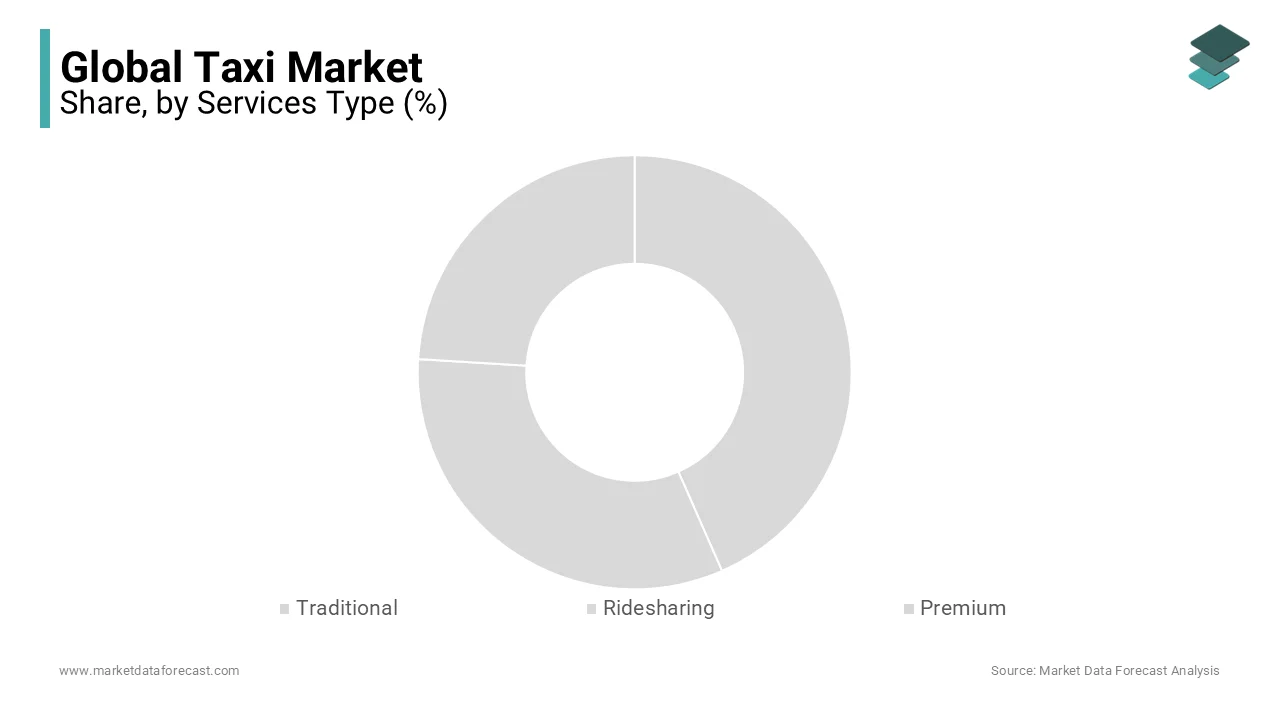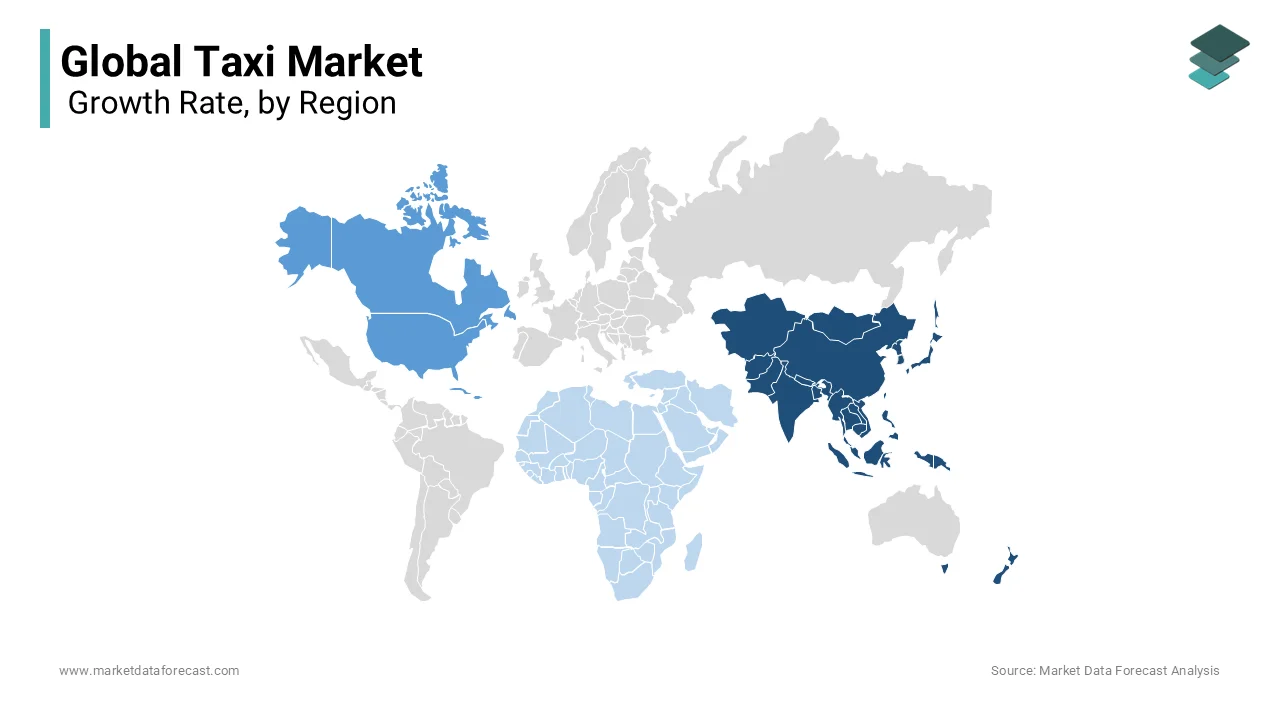Global Taxi Market Size, Share, Trends & Growth Forecast Report By Vehicle (Cars, Motorcycle, Other Vehicles), Services (Traditional taxi services, Ride-sharing services, Premium taxi services), Booking (Online Booking, Offline Booking) and Region (North America, Europe, Asia Pacific, Latin America, Middle East And Africa), Industry Analysis From 2025 to 2033
Global Taxi Market Size
The global taxi market was valued at USD 251.49 billion in 2024 and is anticipated to reach USD 272.62 billion in 2025 from USD 519.74 billion by 2033, estimated to grow at a CAGR of 8.4% during the forecast period from 2025 to 2033.

A taxi is a licensed public transportation vehicle available for hire by the public to take passengers to a requested destination. Typically, a taxi is equipped with a taximeter that calculates the fare based on distance traveled or time spent on the trip, and the final fare is paid by the passenger upon arrival at their destination. Taxis are usually identified by a distinctive livery or color scheme, and drivers are required to have a valid license and adhere to specific regulations governing their behavior, such as not discriminating against passengers based on their race, gender, or other characteristics. Taxis are a common mode of transportation in urban areas and are often used by individuals who do not have access to their own vehicles or prefer not to drive themselves.
MARKET DRIVERS
The trend of increasing urbanization is a significant driver of the taxi market. As more people move to cities and urban areas, the demand for transportation services like taxis is likely to increase. This is because urban areas often have more traffic and congestion, making it challenging to navigate with personal vehicles. Convenience is a significant driver of the taxi market. With the growing number of people preferring not to own a car, taxis offer an excellent alternative to public transport. Taxis provide door-to-door service, making them more convenient than public transportation, which often requires multiple transfers.
The emergence of ride-hailing apps has revolutionized the traditional taxi market, providing a new and convenient way for people to access transportation services. With just a few taps on a smartphone app, customers can easily book a ride, track their driver, and make cashless payments. This has made it more accessible and affordable for people to use taxis, leading to an increase in demand for taxi services. The tourism industry is a significant driver of the taxi market, as many travelers rely on taxis to get around in unfamiliar cities and countries. Tourists may be more willing to pay for the convenience and safety of a taxi service, particularly when navigating an unfamiliar environment. This trend is particularly prevalent in cities with high volumes of business and leisure travelers, where taxis are an essential transportation option.
The trend towards electric and hybrid vehicles offers an opportunity for the taxi market to not only reduce their environmental impact but also potentially lower their operational costs. Electric and hybrid vehicles have lower fuel and maintenance costs, and some cities offer incentives for companies to transition to these vehicles. Additionally, there is a growing market demand for environmentally friendly transportation options, and offering electric and hybrid taxis can differentiate a company from its competitors and attract environmentally-conscious customers. Expanding into the package delivery market can be a lucrative opportunity for taxi companies. With the rise of e-commerce, there is a growing demand for fast and reliable package delivery services. Taxi companies can leverage their existing infrastructure, such as their fleet of vehicles and experienced drivers, to offer competitive package delivery services.
MARKET RESTRAINTS
The increasing competition from ride-hailing apps like Uber and Lyft is a major challenge for the taxi industry. These apps offer convenient and often cheaper alternatives to traditional taxi services, making it harder for taxi companies to attract customers. The high operational costs associated with running a taxi business can be a major challenge for companies in the taxi market. These costs can be a barrier to entry for new players in the market and can make it difficult for existing companies to remain profitable. To overcome this challenge, taxi companies may need to explore new business models, such as partnering with ride-hailing apps or developing more efficient vehicles. Additionally, innovations in technology and payment systems may help to reduce operational costs and improve profitability in the taxi market.
REPORT COVERAGE
|
REPORT METRIC |
DETAILS |
|
Market Size Available |
2024 to 2033 |
|
Base Year |
2024 |
|
Forecast Period |
2025 to 2033 |
|
CAGR |
8.4% |
|
Segments Covered |
By Services Type, Booking Type, Vehicle, and Region. |
|
Various Analyses Covered |
Global, Regional and Country Level Analysis; Segment-Level Analysis; DROC, PESTLE Analysis; Porter’s Five Forces Analysis, Competitive Landscape; Analyst Overview of Investment Opportunities |
|
Regions Covered |
North America, Europe, APAC, Latin America, Middle East & Africa |
|
Market Leaders Profiled |
Ola Cabs, Uber Technologies Inc., Lyft Inc., Didi Chuxing Technology Co., Ltd., Grab Holdings Inc., Gett Inc., Cabify S.A., Easy Taxi, Gojek, Curb Mobility LLC., and Others. |
SEGMENT ANALYSIS
By Services Type Insights

Ride-sharing services have dominated the taxi market, with companies like Uber and Lyft leading the way. These companies have disrupted the traditional taxi industry by offering a more convenient and user-friendly experience through their mobile apps, real-time tracking, and cashless payment options.
By Booking Type Insights
Online booking has become the dominant booking type in the taxi market in recent years. This is due to the increasing use of smartphones and the internet, which has made it easier for consumers to book rides online through taxi company websites and mobile apps.
By Vehicle Insights
Cars are currently the most dominant. This is because they offer a balance between comfort, affordability, and versatility, making them suitable for a wide range of customers and use cases.
REGIONAL ANALYSIS
The Asia-Pacific region is dominating the taxi market, accounting for the largest share of global taxi revenues. This is due to the large population, rapid urbanization, and rising disposable incomes in countries like China, India, and Southeast Asia. Moreover, the Asia-Pacific region has been at the forefront of the ride-sharing revolution, with companies like Ola, Didi Chuxing, and Grab dominating the market. These companies have been able to leverage the region's high population density, traffic congestion, and demand for affordable transportation to build successful ride-sharing businesses.

North America and Europe also have significant taxi markets, but they have been impacted by the disruptive entry of ride-sharing services like Uber and Lyft. The regulatory environment and consumer preferences have been slower to adapt to the new entrants, leading to legal battles and market share losses for traditional taxi companies.
The Middle East and Africa, and Latin America also have taxi markets, but they are more fragmented and less developed than other regions due to infrastructure challenges, political instability, and economic factors. However, some markets in these regions, like Dubai and Sao Paulo, have seen the entry of ride-sharing companies and the growth of luxury taxi services catering to high-end customers.
KEY MARKET PLAYERS
Ola Cabs, Uber Technologies Inc., Lyft Inc., Didi Chuxing Technology Co., Ltd., Grab Holdings Inc., Gett Inc., Cabify S.A., Easy Taxi, Gojek, Curb Mobility LLC. Some of the major key players involved in the global taxi market.
RECENT HAPPENINGS IN THIS MARKET
- In February 2021, Indian ride-hailing company Ola launched its services in London, becoming the latest entrant into the city's highly competitive ride-hailing market.
- In May 2021, Lyft announced its entry into the car rental market, offering customers the ability to rent a car directly from the Lyft app.
- In July 2021, Uber announced a partnership with Walgreens to offer free rides to vaccine appointments for people who are unable to drive or take public transportation.
MARKET SEGMENTATION
This research report on the global taxi market is segmented and sub-segmented based on service type, booking type, vehicle and region.
By Services Type
- Traditional
- Ridesharing
- Premium
By Booking Type
- Online
- Offline
By Vehicle
- Cars
- Motorcycle
- Other Vehicle
By Region
- North America
- Europe
- Asia Pacific
- Latin America
- Middle East and Africa
Frequently Asked Questions
1. What is the CAGR of the Taxi Market from 2023-2028?
The Taxi Market is expected to grow with a CAGR of 8.4% during the forecast period from 2025 to 2033.
2. Which is the dominating region for Taxi Market?
Asia-Pacific is currently dominating the Taxi Market in the region.
3. Which vehicle type is dominating the market for Taxi Market?
cars are currently dominating the Taxi Market by vehicle type.
4. what segments are covered in the global taxi market?
It is segmented by Service Type, Booking Type, and Vehicle, which are covered in the global taxi market.
5. who are the leading market players in the global taxi market?
Ola Cabs, Uber Technologies Inc., Lyft Inc., Didi Chuxing Technology Co., Ltd., Grab Holdings Inc., Gett Inc., Cabify S.A., Easy Taxi, Gojek, Curb Mobility LLC. Some of the major key players involved in the global taxi market.
Related Reports
Access the study in MULTIPLE FORMATS
Purchase options starting from $ 2500
Didn’t find what you’re looking for?
TALK TO OUR ANALYST TEAM
Need something within your budget?
NO WORRIES! WE GOT YOU COVERED!
Call us on: +1 888 702 9696 (U.S Toll Free)
Write to us: [email protected]